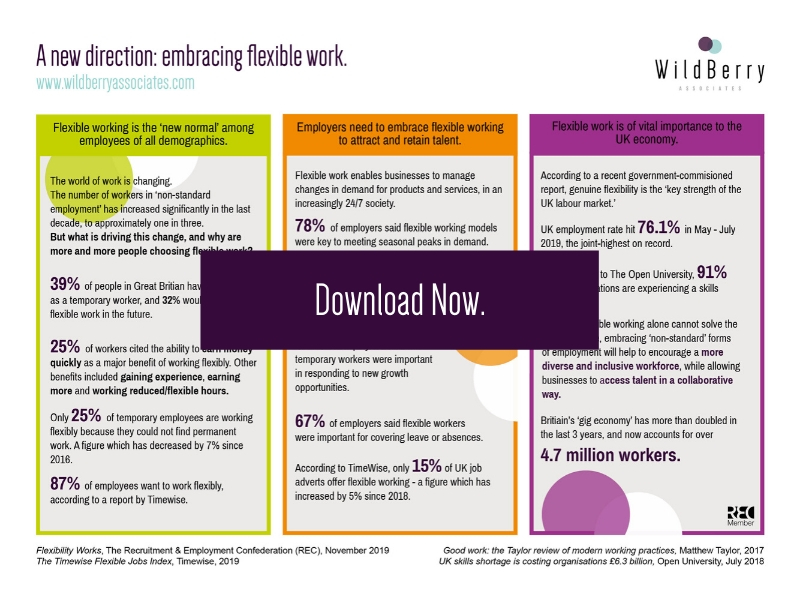Embracing flexible work

The world of work is changing.
The number of workers in 'non-standard employment' has increased significantly in the last decade, to approximately one in three.
But what is driving this change and why are more and more people choosing flexible work?
At Wild Berry Associates, we want to challenge the misconceptions that surround flexible work and promote the benefits two-way flexibility can provide for employers and workers alike.
Flexible working is the 'new normal' among employees of all demographics.
The world of work is changing.
The number of workers in 'non-standard employment' has increased significantly in the last decade, to approximately one in three.
But what is driving this change, and why are more and more people choosing flexible work?
39% of people in Great Britain have worked as a temporary worker, and 32% would consider flexible work in the future.
25% of workers cited the ability to earn money quickly as a major benefit of working flexible. Other benefits included gaining experience, earning more and working reduced/flexible hours.
Only 25% of temporary employees are working flexibly because they could not find permanent work. A figure which has decreased by 7% since 2016.
87% of employees want to work flexibly, according to a report by Timewise.
Employers need to embrace flexible working to attract and retain talent.
Flexible work enables businesses to manage changes in demand for products and services in an increasingly 24/7 society.
78% of employers said flexible working models were key to meeting seasonal peaks in demand.
49% of employers said flexible work provided them with access to key strategic skills.
57% of employers said that temporary workers were important in responding to new growth opportunities.
67% of employers said flexible workers were important for covering leave or absences.
According to TimeWise, only 15% of UK job adverts offer flexible working - a figure which has increased by 5% since 2018.
Flexible work is of vital importance to the UK economy.
According to a recent government-commisioned report, genuine flexibilty is the 'key strength of the UK labour market.'
UK employment rate hit 76.1% in May - July 2019, the joint-highest on record.
Yet, according to the Open University, 91% of UK organisations are experiencing a skills shortage.
Although, flexible working alone cannot solve the skills shortage, embarcing 'non-standard' forms of employment will help to encourage a more diverse and inclusive workforce, while allowing businesses to access talent in a collaborative way.
Britain's 'gig economy' has more than doubled in the last 3 years, and now accounts for over 4.7 million workers.
Download our free infographic today to find out why embracing flexible working is good for employees, businesses and the UK economy.
Click the image below to download.

